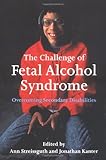Fantastic Antone Grows Up is a field guide to life with an adolescent or young adult with fetal alcohol syndrome/effects. Under the best of circumstances, adolescence is a trying time for young people and their families. The budding adult seeks independence and autonomy while the resistant child within longs for protection and structure; questions about sexuality and work, social commitments, and solitary accomplishments loom large and can create a family battlefield. For the challenged and challenging young people with FAS/E, the circumstances as they begin maturing are never the best.
Â
In this sequel to Fantastic Antone Succeeds, young people with FAS/E and their caregivers report on their experiences coping with the problems of adolescence and young adulthood. Again the editors and authors have concentrated on the wisdom of practice, as they candidly convey which techniques worked and which did not during the difficult passages of the teenage years and beyond.
Â
The twenty-one chapters are grouped according to theme. Section one discusses the meaning of success for adolescents and adults with FAS/E -- the need to define success in new ways. Cindy Gere found her path to success, for example, through creative expression. She graduated from college with a degree in fine arts and successfully completed a program in art. Many of her paintings, including the one illustrating the cover of this book, provide a poignant and candid expression of what FAS/E means to her.Â
Â
Section two discusses strategies that work in areas such as counseling, education, sexuality, trouble with the law, and independent living. Section three covers what families need from the community, including innovative programs that help individuals with FAS/E, and how to get a diagnosis at adolescence. The book also contains important resources, organizations to contact, and internet addresses.
Â
More has been learned about how alcohol poisoning in the womb alters brain function and physical development since the release of Fantastic Antone Succeeds, but science is far from providing the answers that affected young people and their caregivers need. Until such answers are forthcoming, nothing can replace the voices of experience with their practical messages of coping, caring, loving, weeping, laughing, and -- more often than might be expected -- succeeding.















